Review of the Haida Bluestone and Premium Brass UV Filters
by Nando Harmsen
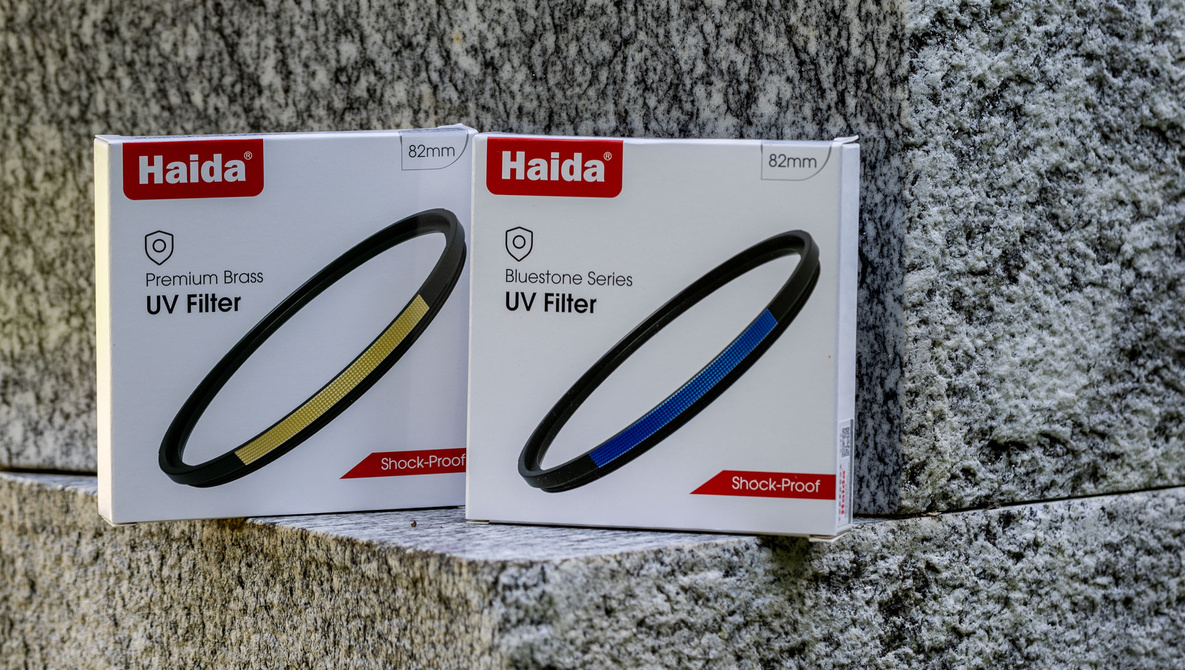
I was introduced to two brand-new UV filters: the Bluestone UV filter and the Premium Brass UV filter. These filters boast high light transmission, a multi-layered coating, and substantial protection thanks to the shock-proof Schott B270 glass, I reviewd both filters.
UV filters are primarily used to protect the front glass lens element. They also prevent excess UV light from entering the lens, which is known to cause a bluish haze over images. Today, most coatings on front lens elements already filter out most UV light, raising the question of whether a UV filter offers more benefits beyond protection.
The Haida Bluestone and Premium Brass UV Filters
The Haida Bluestone and Premium Brass UV filters share many similarities, making it difficult to distinguish between the two. Both are made of Schott B270 glass and have a 3.1 mm ultra-thin frame.
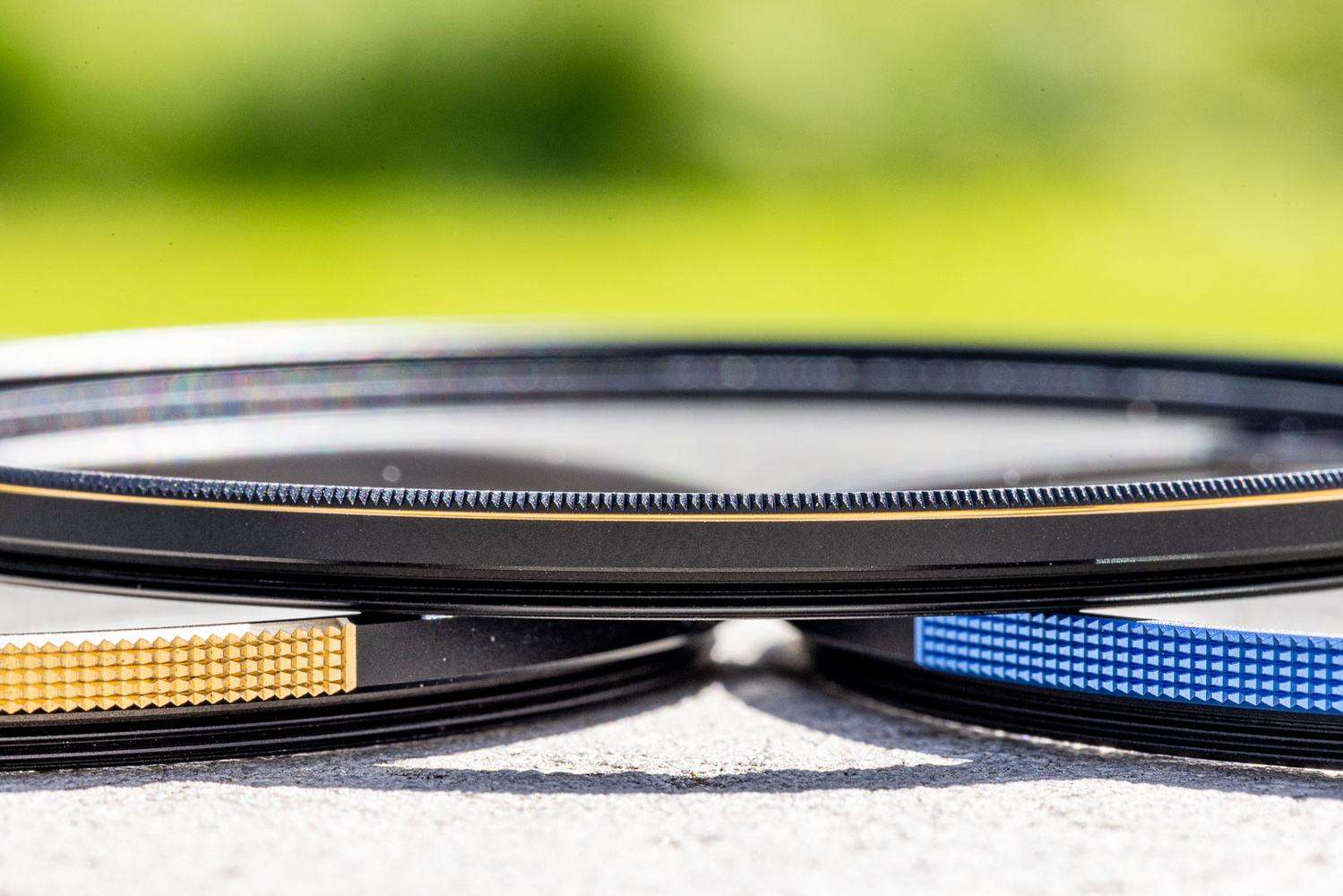
The Haida Premium Brass UV on the left, the Bluestone UV on the right, and on top the brand new Haida Greystone UV filter.
The frame features a uniform surface gloss and regular threads. The design includes colored knurling for easy grip when adding or removing the filter from the lens. The Bluestone is made of high-quality aviation aluminum with blue-colored knurling, while the Premium Brass is made of durable brass, with brass-colored knurling. Available sizes range from 52 mm to 95 mm in diameter.
The difference between the Bluestone and Premium Brass lies in the number of coatings and light transmission. The Bluestone UV filter has 24 layers of coating, divided over both sides of the glass. The Premium Brass UV filter offers 18 layers of coating on each side, providing additional protection and quality. The light transmission is 99.4% for the Bluestone and 99.8% for the Premium Brass.
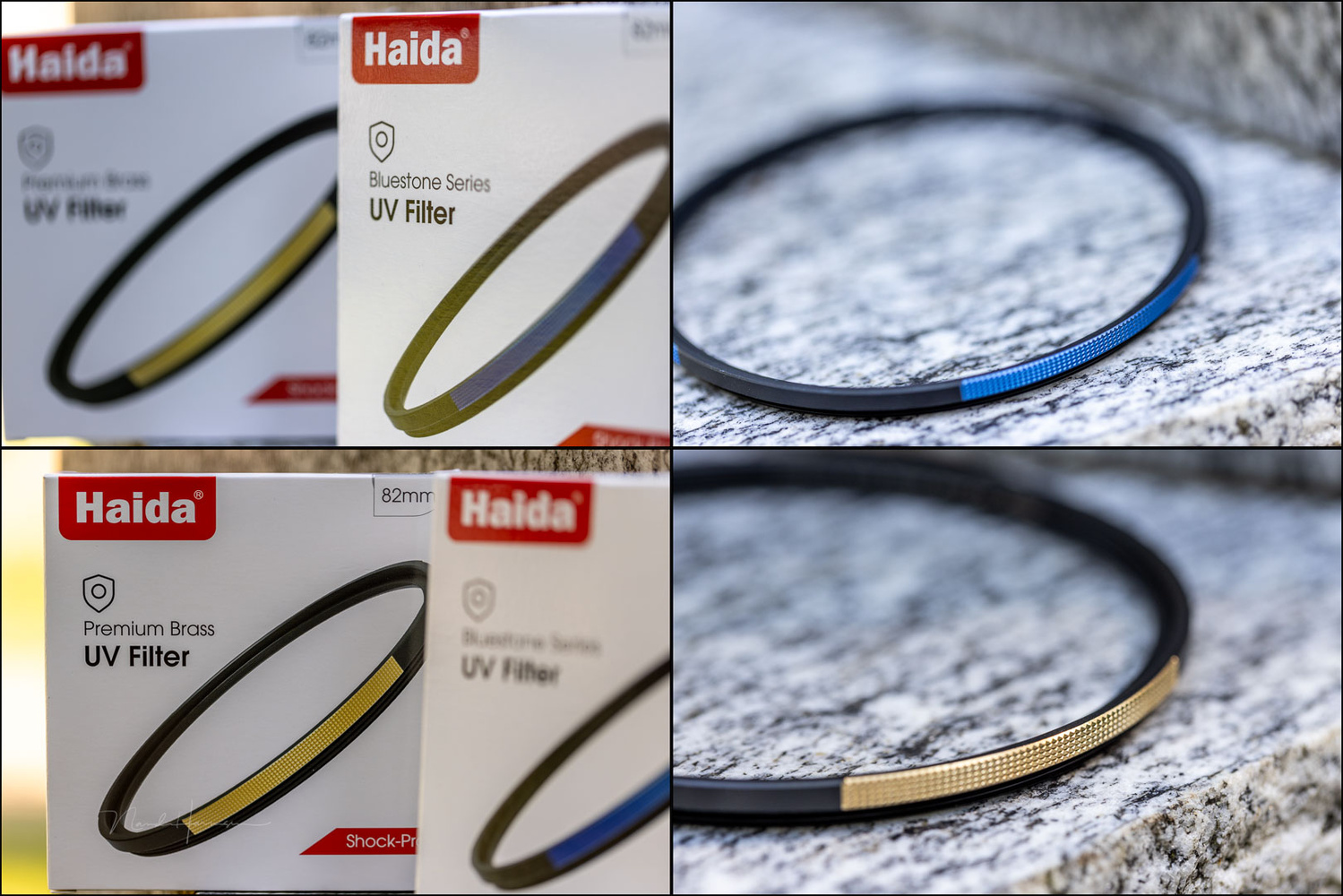 Both filters are very similar, apart from the color accent. There is difference in light transparency and the amount of coating layers.
Both filters are very similar, apart from the color accent. There is difference in light transparency and the amount of coating layers.
Protection
UV filters are mostly used as extra protection for a lens. And for good reason: a damaged filter is a less costly replacement compared to a lens that needs repair. Both the Haida Bluestone UV filter and the Premium Brass UV filter protect against dust, rain, fingerprints, scratches, and oily substances. The multi-layered coating on both sides of the filter allows for easy cleaning. The filters are both shock-proof, capable of enduring impacts up to a certain level without shattering.
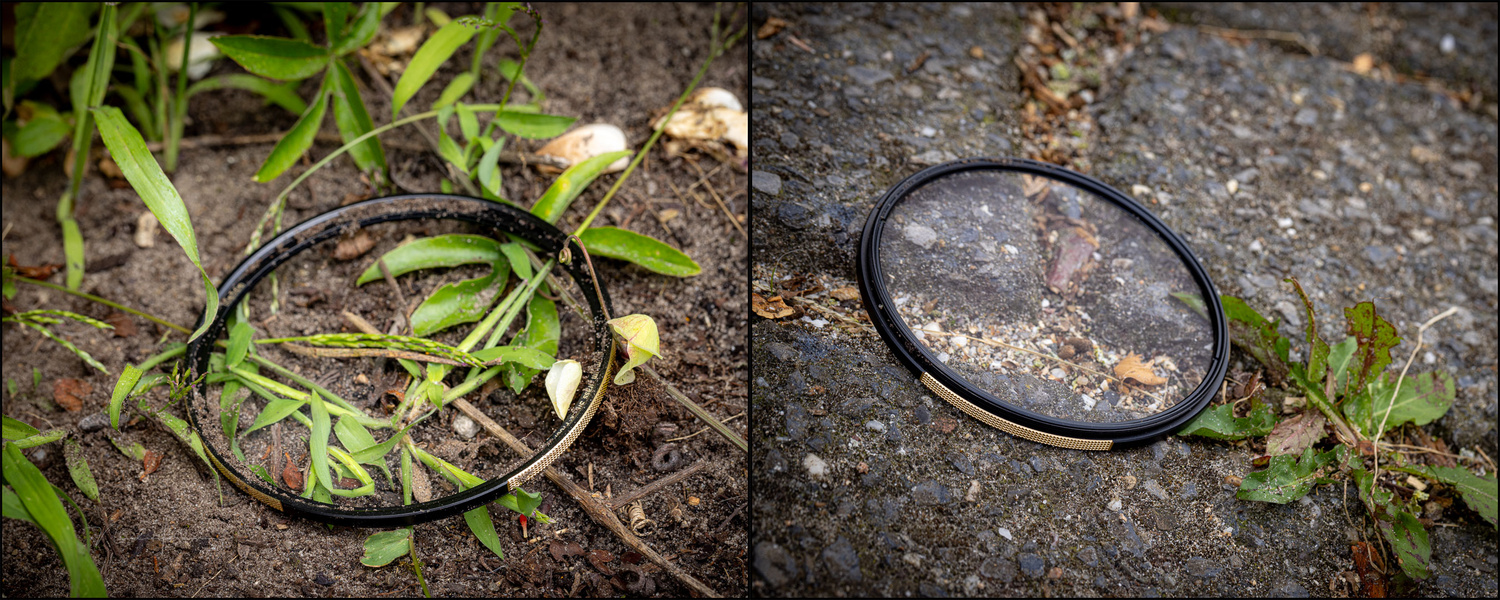 I did not perform a drop test. But I did not spare the filters for this test.
I did not perform a drop test. But I did not spare the filters for this test.
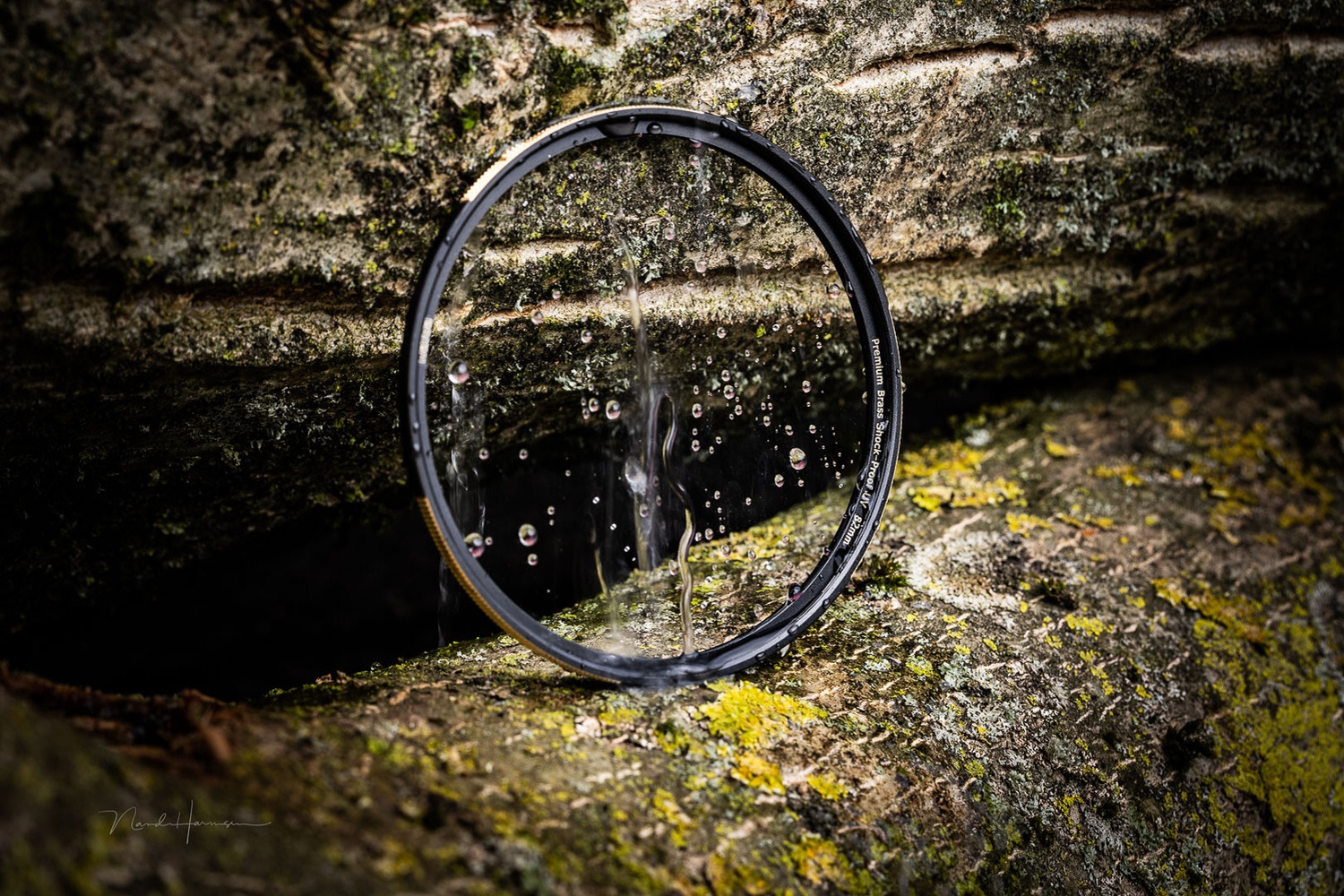 A rain shower will leave water droplets on the filter, but it's easy wiped clean.
A rain shower will leave water droplets on the filter, but it's easy wiped clean.
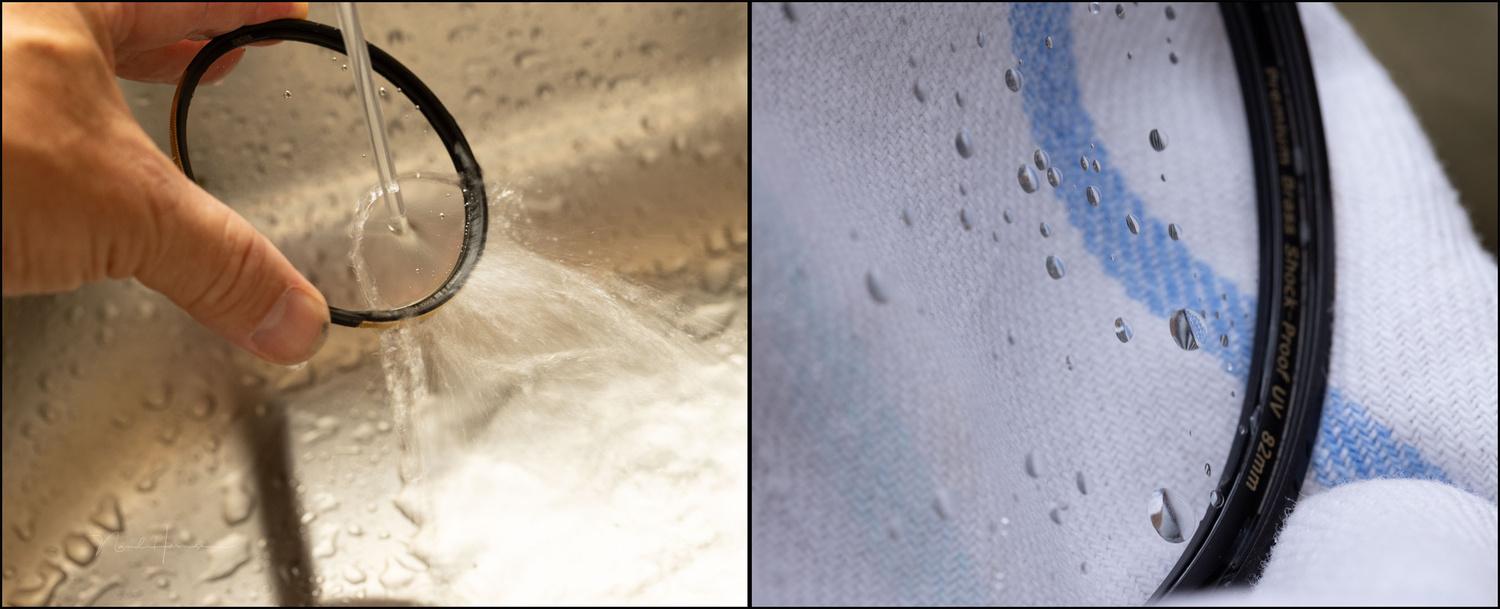 Cleaning is easy. Dust, fingerprints, dirt poses no problem.
Cleaning is easy. Dust, fingerprints, dirt poses no problem.
Vignetting
One problem with using ultra-wide angle lenses is the risk of vignetting when a filter is placed in front of the lens. Slim filters are advised. The Haida Bluestone and Premium Brass UV filters both have a 3.1 mm ultra-thin frame, fitting this criterion.
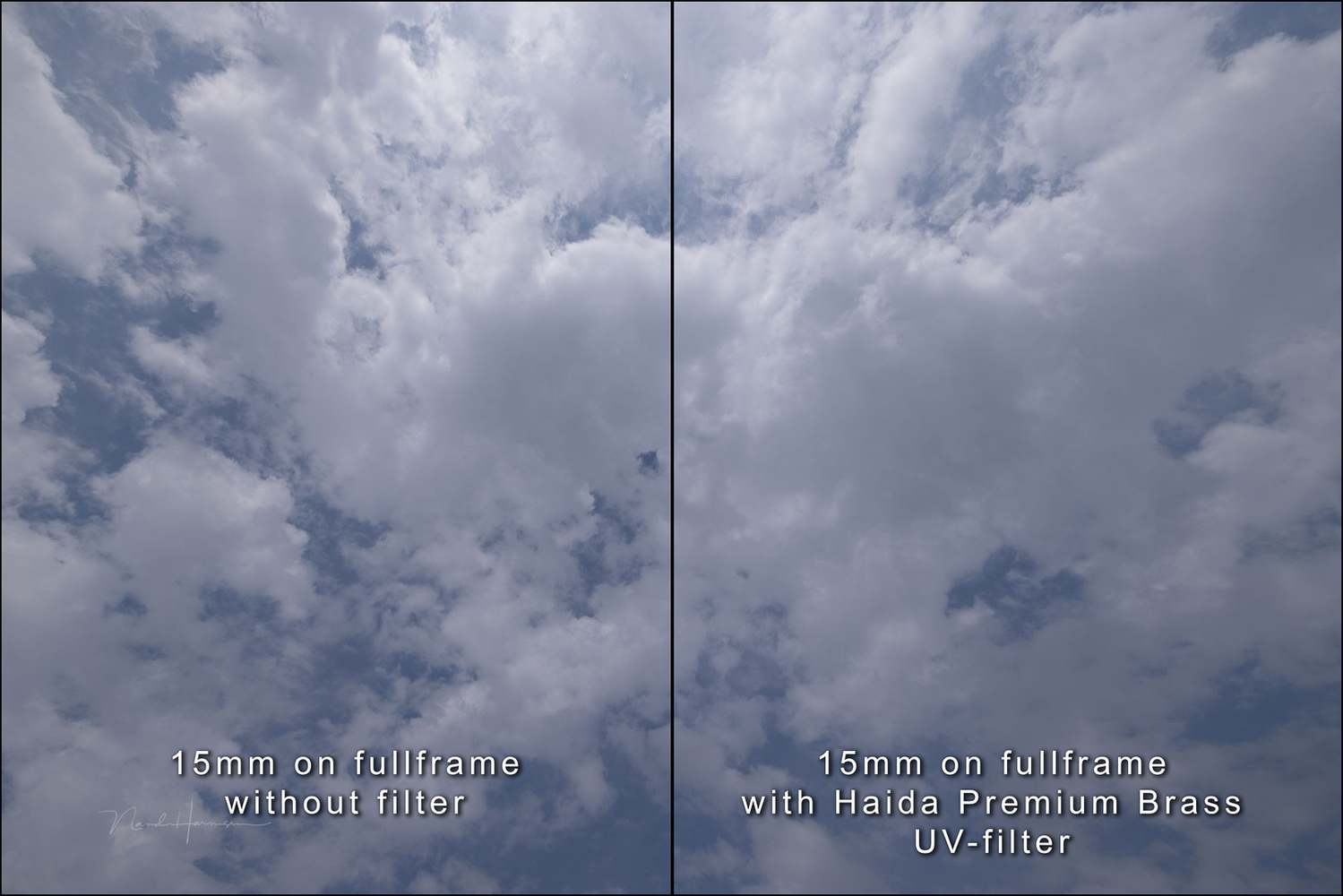
There is no additional vignetting at 15mm focal length on a full frame camera, thanks the 3.1mm thickness of the filters.
I tested the filters on the Canon EOS R5 full frame camera with an RF 15-35mm f/2.8L IS USM lens at 15mm focal length. I did not notice any additional vignetting, indicating that it’s no problem using these filters, at least up to a field of view resembling 15mm on a full frame camera.
Image Quality
Most UV light is absorbed by the atmosphere, and at sea level, the amount of UV light is relatively low. Most lens coatings are sufficient to prevent the typical bluish color cast.
 There is no color cast. Since this is shot near sea level, the amount of UV light is small. Use of the UV filter makes no difference in this situation.
There is no color cast. Since this is shot near sea level, the amount of UV light is small. Use of the UV filter makes no difference in this situation.
Things change at higher altitudes. UV levels increase by up to 12% with every 1,000 meters of altitude. In mountainous regions, increased UV levels may affect image quality. In such cases, an additional UV filter offers significant benefits.
Under these circumstances, the Haida Bluestone and Premium Brass UV filters will improve image quality and clarity. Unfortunately, the Netherlands does not have mountains, so I could not test the results of both the Bluestone and Premium Brass UV filters in such conditions.
However, these filters do not negatively affect image quality. There is no noticeable color cast whatsoever. It’s feasible to use the Bluestone or Premium Brass filters primarily for protection. The high light transmission of 99.4% and 99.8% does not affect exposure, making it possible to leave the filter permanently on the lens.
Flares
One problem with an additional filter in front of the lens is the increased risk of flares. If the lens has good flare resistance, a filter can diminish this to some degree. If flares are prone to occur with the lens, a filter can intensify this issue.
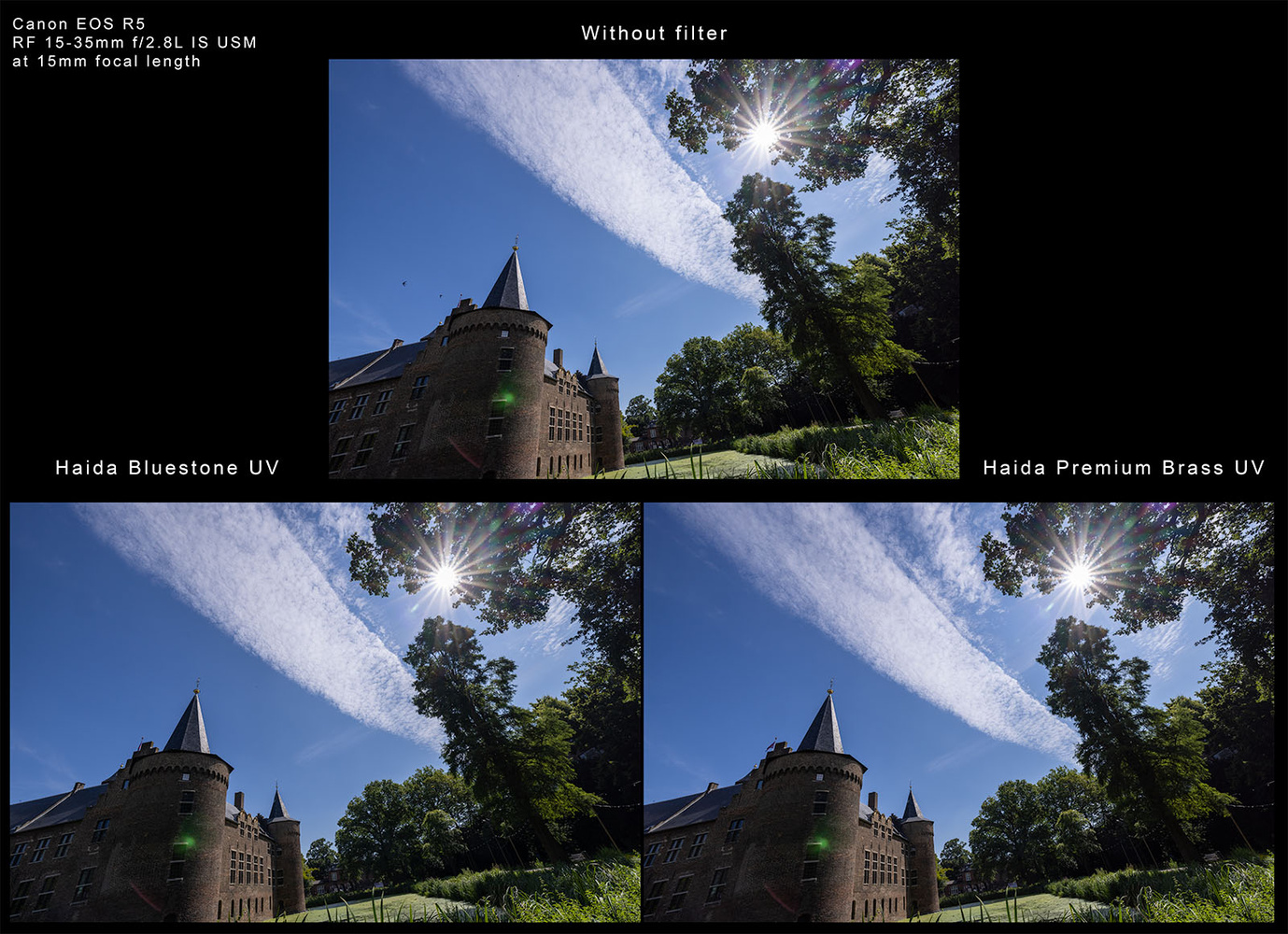 Using the filters makes no difference for the amount of flares in this situation.
Using the filters makes no difference for the amount of flares in this situation.
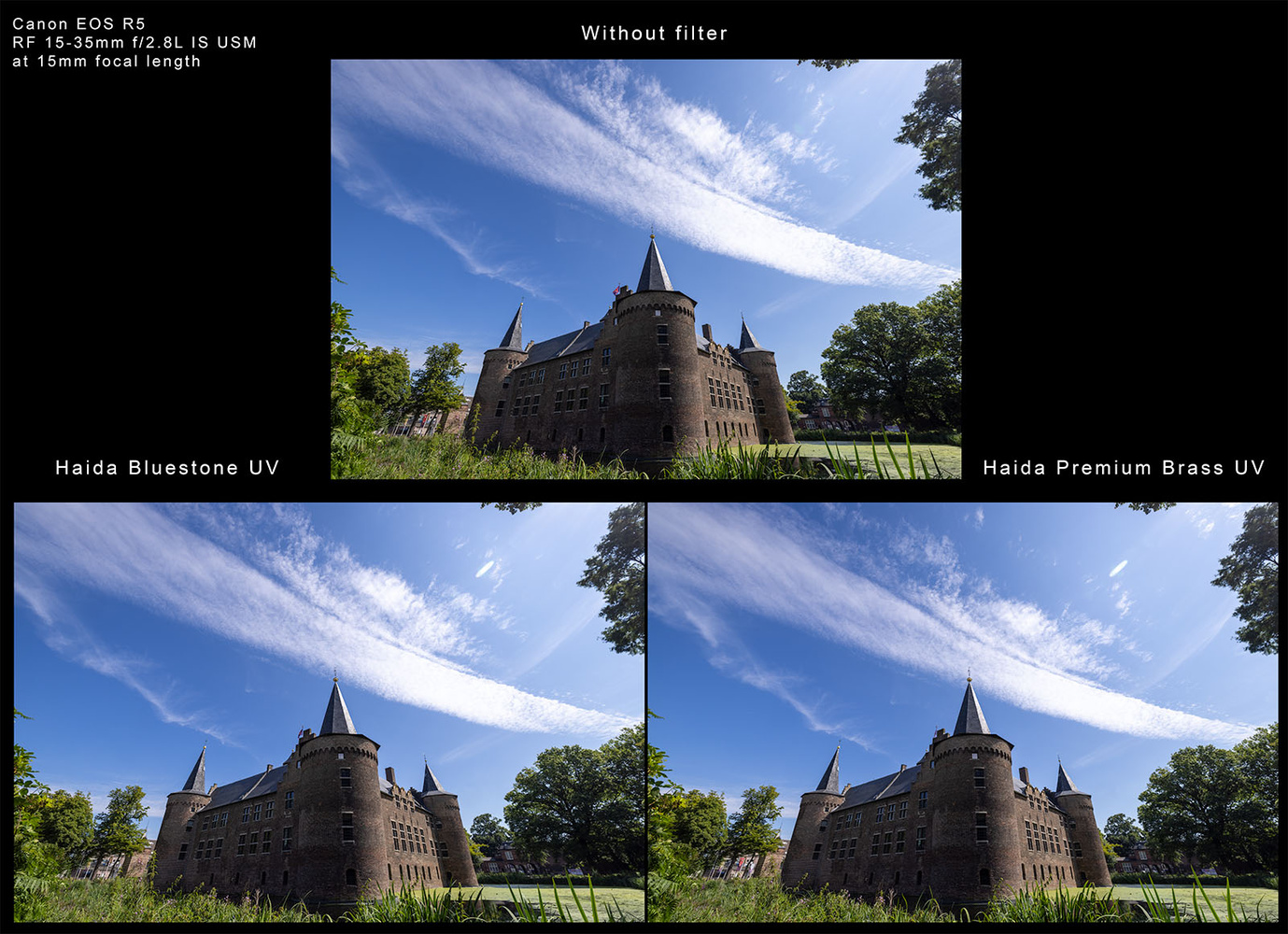 With the sun outside the frame I noticed an extra light reflection in the top right.
With the sun outside the frame I noticed an extra light reflection in the top right.
Although both the Haida Bluestone and Premium Brass UV filters add another layer of glass in front of the lens, there is little increase in flare. I did not notice many flares under various conditions.
My Conclusion
Personally, I never use UV filters for my lenses. This has resulted in a few instances where the front lens was scratched, unfortunately. This shows that a UV filter indeed adds another layer of protection that cannot be ignored. However, if you’re not like me and want additional protection for your pricey lens, both the Haida Bluestone UV filter and the Haida Premium Brass UV filter are good choices.
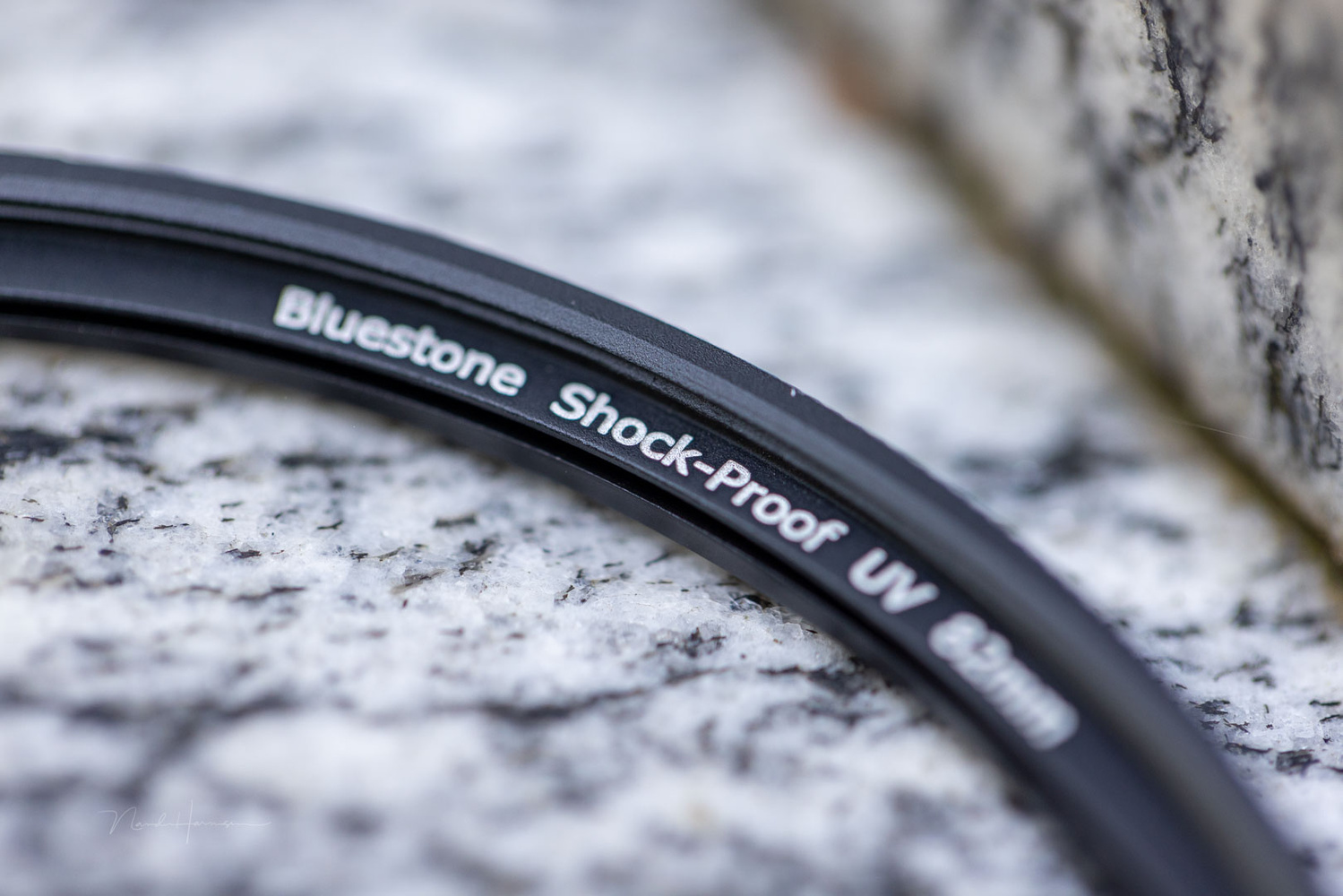 The most important reason for using these filters is the protection. Unless you shoot a lot high up in the mountains, the UV light blocking makes not much difference.
The most important reason for using these filters is the protection. Unless you shoot a lot high up in the mountains, the UV light blocking makes not much difference.
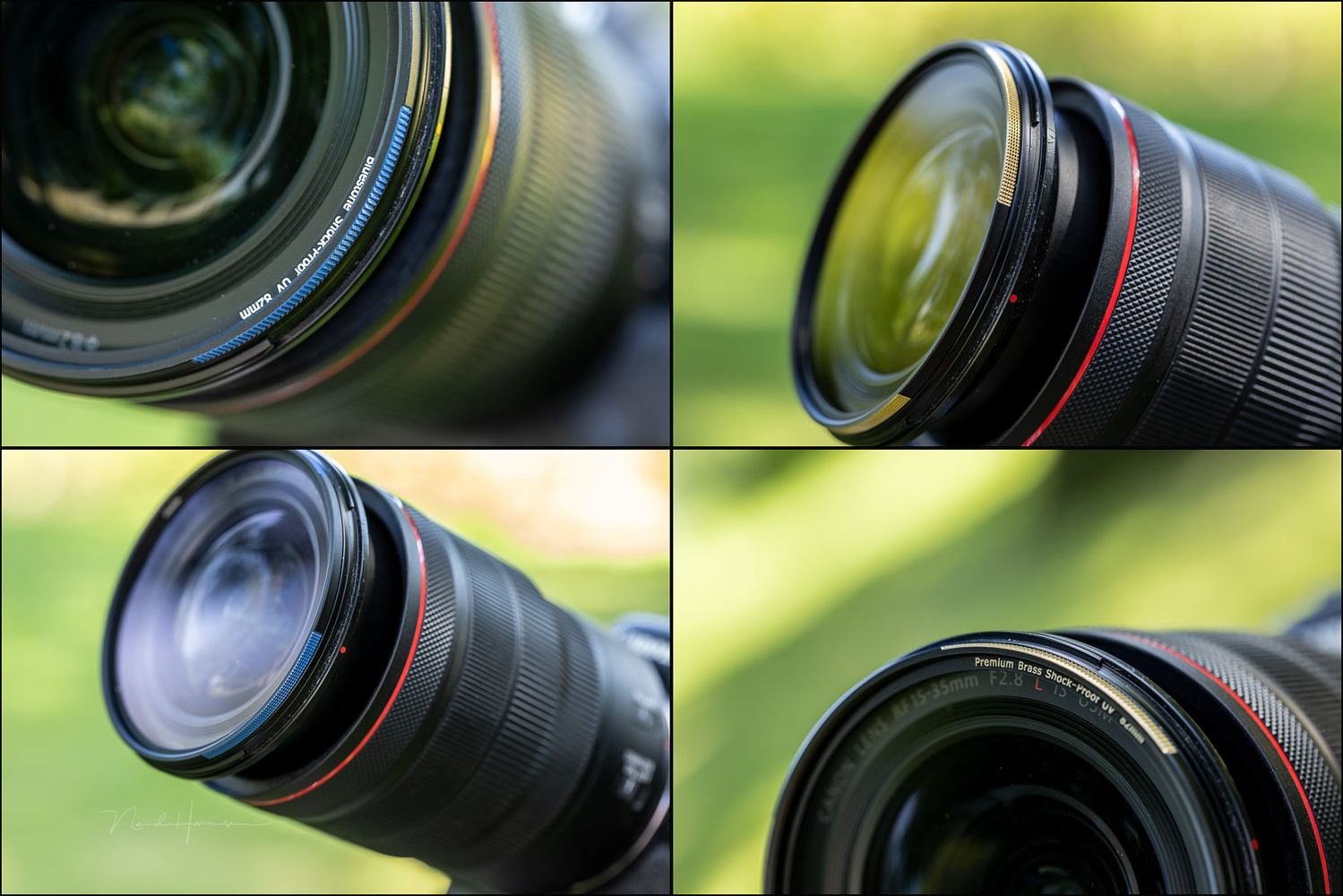
The Haida Bluestone UV and Premium Brass UV.
The Haida Premium Brass UV filter sells for $90 for the 82 mm size, while the Bluestone sells for a little less than $57. If maximum light transparency and coatings give you the best peace of mind, you should definitely go for the Premium Brass.
I want to thank Haida for providing the filters. Although I haven’t paid for the filters myself, the opinion is my own and not influenced by the company.
About Nando Harmsen
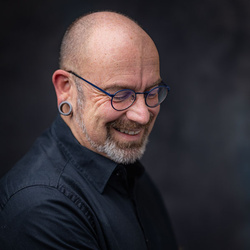
Nando Harmsen is a Dutch photographer that is specialized in wedding and landscape photography. With his roots in the analog photo age he gained an extensive knowledge about photography techniques and equipment, and shares this through his personal blog and many workshops.
For More Information
Website: https://www.nandoonline.com/
Facebook: https://www.facebook.com/landschapsfotograafnando
Instagram: https://www.instagram.com/nandoonline
Related News
- Review of the Haida Bluestone and Premium Brass UV Filters
- Haida Picture Appreciation | February 2026
- Haida NanoPro Magnetic Filter Kit for Digital Camera
- Haida Picture Appreciation | January 2026
- Haida V2 Anti-Fog Belt
- Haida Picture Appreciation | December 2025
